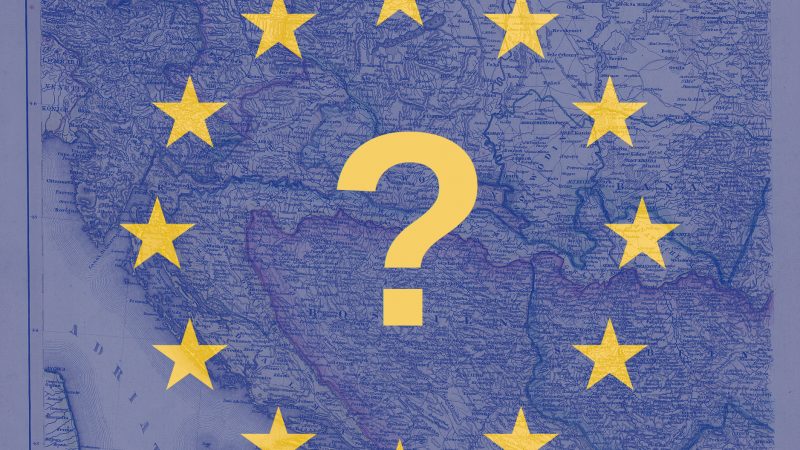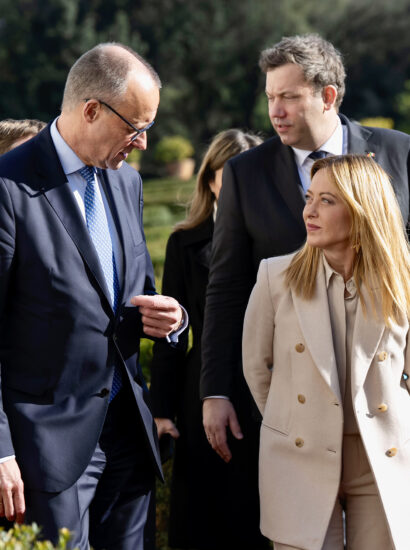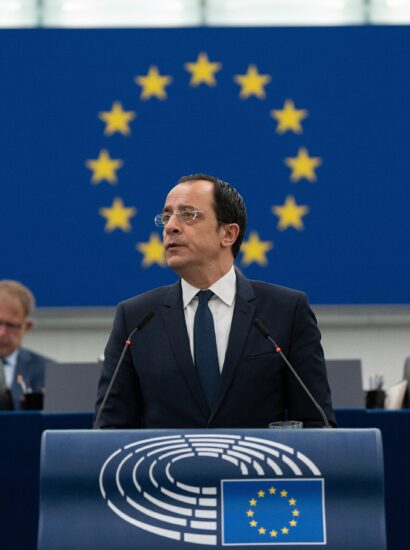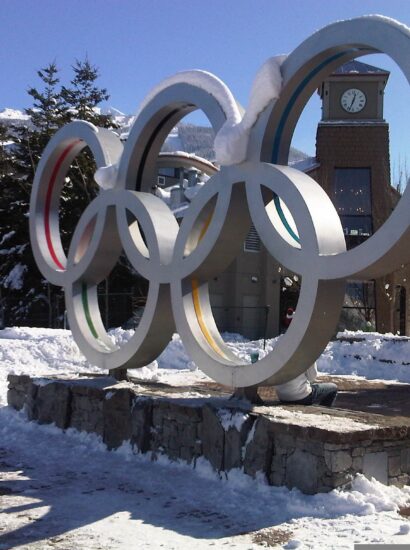In her annual State of the Union Address, President of the European Commission Ursula von der Leyen named the countries having to join the European Union as soon as possible. Among them, President von der Leyen highlighted Ukraine, Moldova and Georgia. The potential candidacy of these three post-Soviet states is naturally enhanced by the Russian-Ukrainian conflict on the EU’s immediate border. On the other hand, the countries in the Western Balkans (from this point referred to as WB countries) – having waited long for EU membership – are only mentioned by the European Commission (EC) President as an unspecified block. This tells a lot about the EU’s commitment to this region.
The WB countries’ long road to the EU membership – an unfulfilled dream?
While Brussels is showing its teeth to the Kremlin, EU enlargement is falling flat when it comes to motivating the WB countries. After the European Union took just weeks to decide on candidate status for Ukraine and Moldova, Western Balkan countries – some of which started their accession path more than a decade ago – felt the bloc owed them a sign. One example is Bosnia and Herzegovina, the country that applied to join the bloc in 2016 and just received the candidate status.
“We expect from the leaders of Bosnia and Herzegovina to make full use of this opportunity and to make the following reforms as soon as possible,” said Olivér Várhelyi, European Commissioner for Neighbourhood and Enlargement in June this year. Bosnia has spent almost two decades on the EU’s waiting list: it was first identified as a “potential” EU candidate in June 2003 and submitted its formal application in February 2016.
Serbia also applied in 2009, got candidate status in 2012 and started negotiations in 2014. There is a serious lack of alignment from it though. For instance, Serbia has condemned Russia’s aggression on Ukraine but has so far refused to implement any sanctions against Moscow, a step Brussels traditionally expects from its partners. The other member state of their former commonwealth, Montenegro has been doing a lot better. It applied in 2008, secured candidate status in 2010 and accession negotiations started in the summer of 2012. “It’s the most advanced in the negotiations, it has no open political issues with neighbours, it’s very small and it’s digestible,” said Dimitar Bechev, a visiting scholar at Carnegie Europe in his prediction, adding that all that needed was political will on both sides and the country of 620,000 could be a member by the end of the decade.
“If there was no sovereignty dispute, you could see Serbia making strides and basically because it has the administrative capacity and the size and everything and some friends in the EU. They could have been easily the next country to accede to the EU but Kosovo is such an impediment” he went on.
Yet, for all of its claims that reforms mean progress, this has not been the case for North Macedonia and Albania. The longest-standing bid is North Macedonia’s. Skopje first applied in 2005 with the Commission recommending that negotiations start in 2009. Their bid was first blocked by France and the Netherlands – which argued the enlargement process needed to be improved before new countries would join. After the latest EU-Western Balkans conference in June this year, Bulgaria has accepted a French-brokered deal, and withdrew its veto. Therefore, a long period of wrangling, the negotiations on the EU accession could began. Albania also applied in 2009, received candidate status in 2014 and got the all-clear from the Commission to start negotiations in 2018. Tirana’s bid is coupled with North Macedonia’s, that’s why it has been treated as collateral, until now.
EU enlargement in the Balkans is a two-way street. On the one hand, the European Commission sets out in its country reports the specific areas where progress is expected from the candidate countries. On the other hand however, the WB states cannot be expected to meet the accession criteria without getting any tangible reward. The EU’s financial assistance is not a sufficient reason for a government to embark on costly reforms, such as ensuring the judiciary is free of political interference or the media can investigate someone’s business partners.
Potential candidate status communicates that the countries of the Western Balkans have a much longer path to walk to membership as a goal. This clearly does not strengthen the sense of belonging to Europe.
Lack of Commitment
The EU’s accession process cannot be viewed independently of the Union’s internal events. The 2004 and 2007, there was an increasing number of voices of opposition to the EU’s accession process. One of the main arguments for enlargement is – correctly – the need for institutional reform of the EU. Two of the most obvious warning signs, absorption capacity and enlargement fatigue have been referred to frequently. This suggests that the European Union prioritizes the issue of stability in the region over integration, seeking to achieve stability through integration.
Meanwhile, the perception of the EU among the citizens of the WB countries is deteriorating. This phenomenon, known as “pre-accession fatigue”, is confirmed by opinion polls in the Western Balkans: in Serbia, there is a 50/50 split between those who support membership and those who think Serbia will never become a member of the EU. Similarly, a third of Bosnians and a third of Macedonians think that their country will never become a member of the European Union. In Northern Macedonia, a third of people in 2021 said they did not trust EU membership.
Since the EU in 2009–2010 removed visa requirements for citizens of WB countries (except for Kosovo) to travel to the EU, it has run out of immediate incentives to offer these countries.
Europe of Concentric Circles – The European Political Community
On 31 December 1989, a few weeks after the fall of the Berlin Wall, President François Mitterrand of France called for the creation of ‘a European confederation’ designed to ‘associate all states of [the] continent in a common and permanent organisation for exchanges, peace and security’. But the project collapsed in less than a year, because of the lack of interest.
Twenty-three years later, on the day of Europe, another visionary French president, Emmanuel Macron called for the establishment of a European Political Community (EPC), a club to foster co-operation between the EU and its neighbors.
“This new European organization would allow democratic European nations that subscribe to our shared core values to find a new space for political and security cooperation, cooperation in the energy sector, in transport, investments, infrastructures, the free movement of persons and in particular of our youth. Joining it would not prejudge future accession to the European Union necessarily, and it would not be closed to those who have left the EU” – said Mr. Macron in his speech at the Conference on the Future of Europe.
This means a Europe of concentric circles where the six Western Balkan countries are relegated to an outer circle together with Georgia, Moldova, Ukraine, and possibly the UK and Turkey. The consequence is in short to medium term is that these countries would stay out of the Union and they would not enjoy the privileges of membership, including access to decision-making power. On the other hand, they could be eligible for some of the benefits of integration, namely access to the single market and access to the EU budget. Macron’s vision is not universally shared in the EU. Western Balkan countries run the risk of being forever stuck in the waiting room.
German Chancellor Olaf Scholz called for an expanded European Union: “a united EU of 27, 30, 36 states with more than 500 million free and equal citizens can bring its weight to bear even more strongly in this world”.
The first ever EPC summit was held in Prague, in early October. It was also an informal meeting of the leaders of European Union. According to the released guest list there were 44 invited participants. “We want the whole of Europe, not only the European Union, to pursue a policy of security, peace, expansion, freedom and economic growth. We want to help our neighbors. We know very well that peace throughout Europe depends on a safe neighborhood, so to speak, but also in the Western Balkans” – Polish Prime Minister Mateusz Morawiecki said just before the event. Macron, on his part, said the aim of the meeting was to send a message of unity and to “build a strategic intimacy” with all European countries.
Pretty much everything else about the EPC is up for debate.
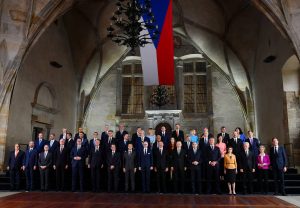
European leaders at European Political Community Prague Summit, Czech Republic. (Photo: President.az, CC BY 4.0 via Wiikimedia Commons)
No joint statement was released at the end of the meeting. EPC leaders should meet twice a year. The compromise scenario would be that it is modelled on the G20 with summits organised on a rotating basis. There is also a question of budget and whether or not there should be a common pot of money to pay for the different projects that may be undertaken or whether countries should just pitch in depending on their interests. And that leads to how decisions are made: Should they be taken as a group of more than 40 or should so-called “coalitions of the willing” be allowed to proceed. Much will also depend on the type of voting required for decisions to be taken: unanimity or qualified majority.
The initial references by Macron to bring democratic nations of Europe together around the table has also been left behind otherwise, one would not see the leaders of Azerbaijan, potentially even Türkiye, around the table and that the focus of the EPC is shifting from a democratic alliance to a geopolitical alliance.
An Example of Competence – the EU as a Security Actor in the WB Region
Despite the war in Ukraine, the West has not been distracted from the risks of destabilization inside Bosnia and Herzegovina. Only days after Russia’s invasion of Ukraine, the EU decided to almost double the size of its EUFOR force to 1,100 troops from 600 troops by sending in reserves to stave off potential instability.
The Western Balkans is the region where the EU evolved significantly as a security actor and substantially developed its crisis management capabilities.
Since 2003, EU peace support operations – CSDP missions – have become one of the most potent instruments at the EU’s disposal for facilitating the transition of post-conflict zones from violence to stability, and the transformation of divided societies to where the rule of law and good governance are respected. EU civilian and military operations – including either or both “strengthening” (support) and “substitution” (executive) components – were deployed in the former Yugoslav Republic of Macedonia (EUFOR Concordia 2003, EUPOL Proxima 2004-2005, EUPAT 2006), in Bosnia and Herzegovina (EU Police Mission 2003-2012, EUFOR Althea 2004 – present), and in Kosovo (EULEX 2008-present). The CSDP missions have also been instrumental to an agenda focused on the countries’ EU accession process.
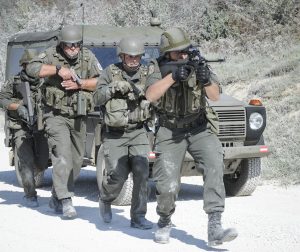
Austrian soldiers during the military drill ‘Quick Response 2016’ for EUFOR Althea in October 2016 near Banja Luka in Bosnia and Herzegovina. (Photo: Bundesheer Fotos from Österreich, CC BY-SA 2.0 via Wikimedia Commons)
Russia, China – dangerous actors in the region
The Balkans is a conducive environment for punching back against the United States and the EU. Russia has several strategic goals in the region. It seeks to prevent the Western Balkan states of Albania, Bosnia and Herzegovina, Kosovo, Montenegro, North Macedonia, and, most importantly, Serbia from joining the EU. It also wants to stymie NATO membership aspirations of the remaining Balkan countries that have not gained membership in the alliance and to disrupt NATO activities in the region.
The Kremlin’s track record includes its longtime refusal to recognize Kosovo’s independence, a brazen coup attempt in Montenegro, support for separatist-minded leaders in Bosnia and Herzegovina in order to sow domestic or interstate political tensions. Russia’s hand is mostly visible in the intelligence and GRU (military intelligence) operations it has conducted across the region. Serbia secured a three-year contract for deeply discounted Russian gas in May 2022. The deal angered EU members, although implementation is uncertain. The war in Ukraine, however, has introduced tension into the Russian-Serbian bilateral relationship. Belgrade voted in favour of the March 2022 United Nations General Assembly resolution condemning Russia’s attack on Ukraine. Serb nationalists were dismayed that Moscow cited Kosovo as a precedent for its recognition of the Luhansk and Donetsk.
Still, Russia remains a dangerous actor in the Western Balkans. It has a proven capacity and willingness to play the spoiler in regional reconciliation and integration processes.
Meanwhile, the Balkans is witnessing a relatively slow but dynamic Chinese take-up. The capital-rich, economically prosperous China finds the capital-poor, foreign-investor-hungry Western Balkans an ideal location. In 2012, the “16+1” Silk Road Cooperation was established in Warsaw to develop the organizational framework for this expansion, with the aim of enhancing economic, trade and scientific cooperation with countries in the region. According to an unofficial tally, China invested €32 billion in the Balkans between 2009 and 2021, about a third of it in Serbia. The Belgrade-Thessaloniki high-speed railway is being built with Chinese loans, and the Peljesac Bridge, a strategic investment in EU member Croatia financed with EU and national funds, was built by the China Road and Bridge Corporation.
Conclusion
The loss of credibility of the EU in the region foreshadows the emergence of a power vacuum. The traditional regional actors (historically Turkey and Russia, with the US and China as relatively new actors) are very active and able to gain influence. Nevertheless, the war in Ukraine could cast enlargement policy in a new light as a strategic instrument of the European Union, which is increasingly forced into a geopolitical role. For Ukraine, the in-between situation in the no-man’s land between the EU and Russia has led to a major tragedy. What is happening in the East is a warning sign that something similar could happen to the South. Of course, the European Union cannot exclude itself from the consequences of the instable neighborhood. It could lose credibility not only in the Western Balkans countries, but also in the eyes of the international community, and face another setback in the effectiveness of its foreign policy.

